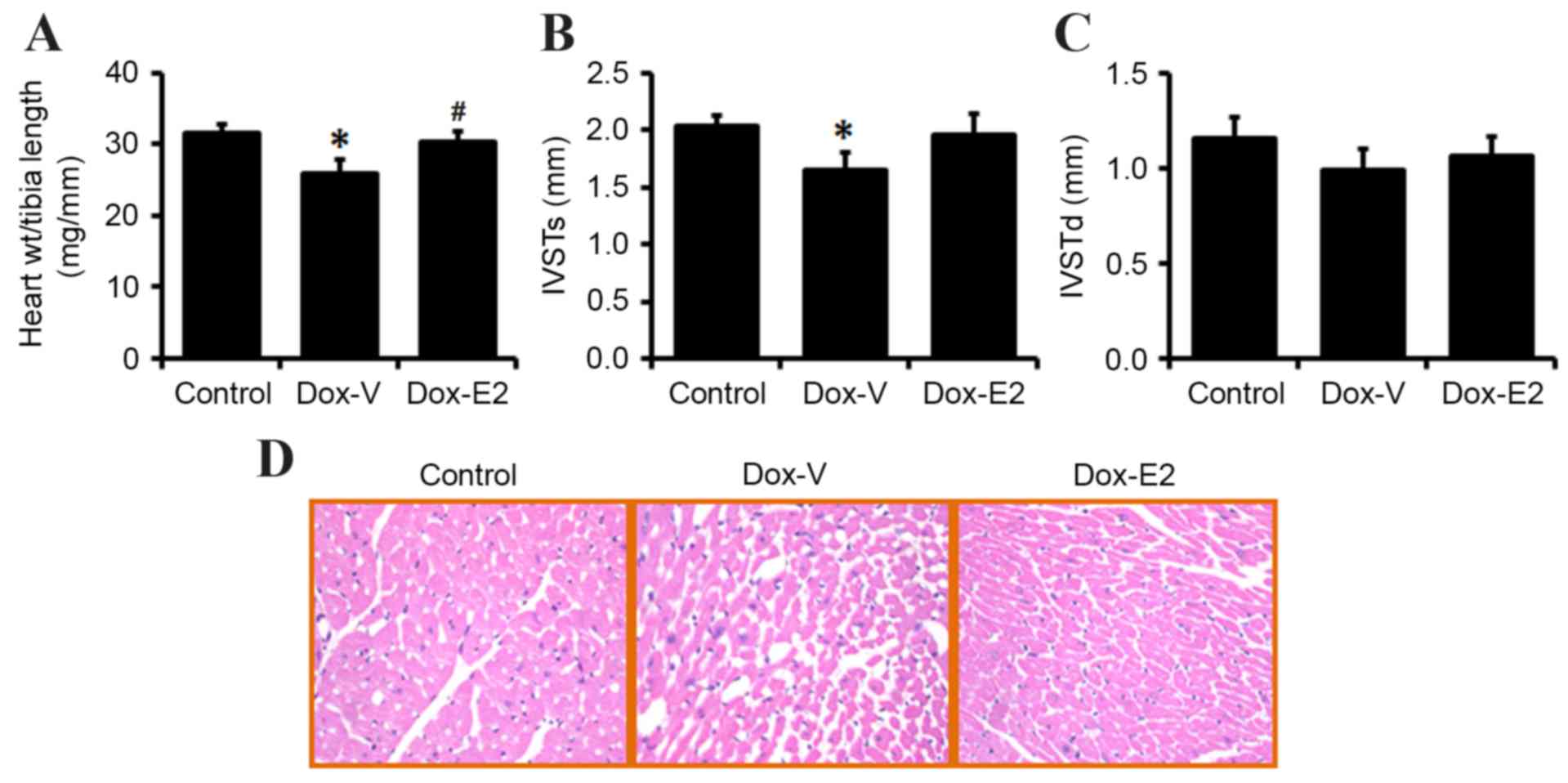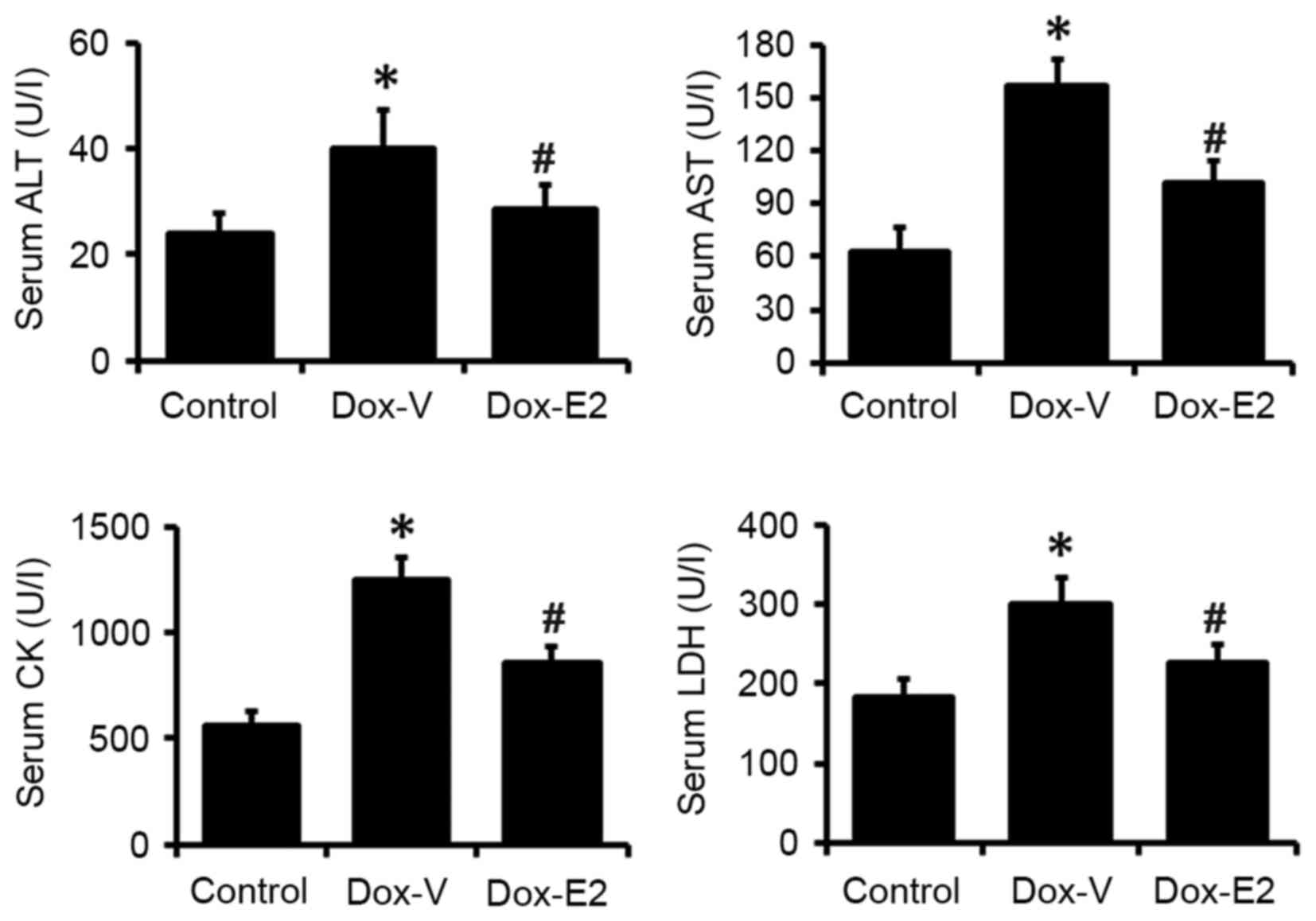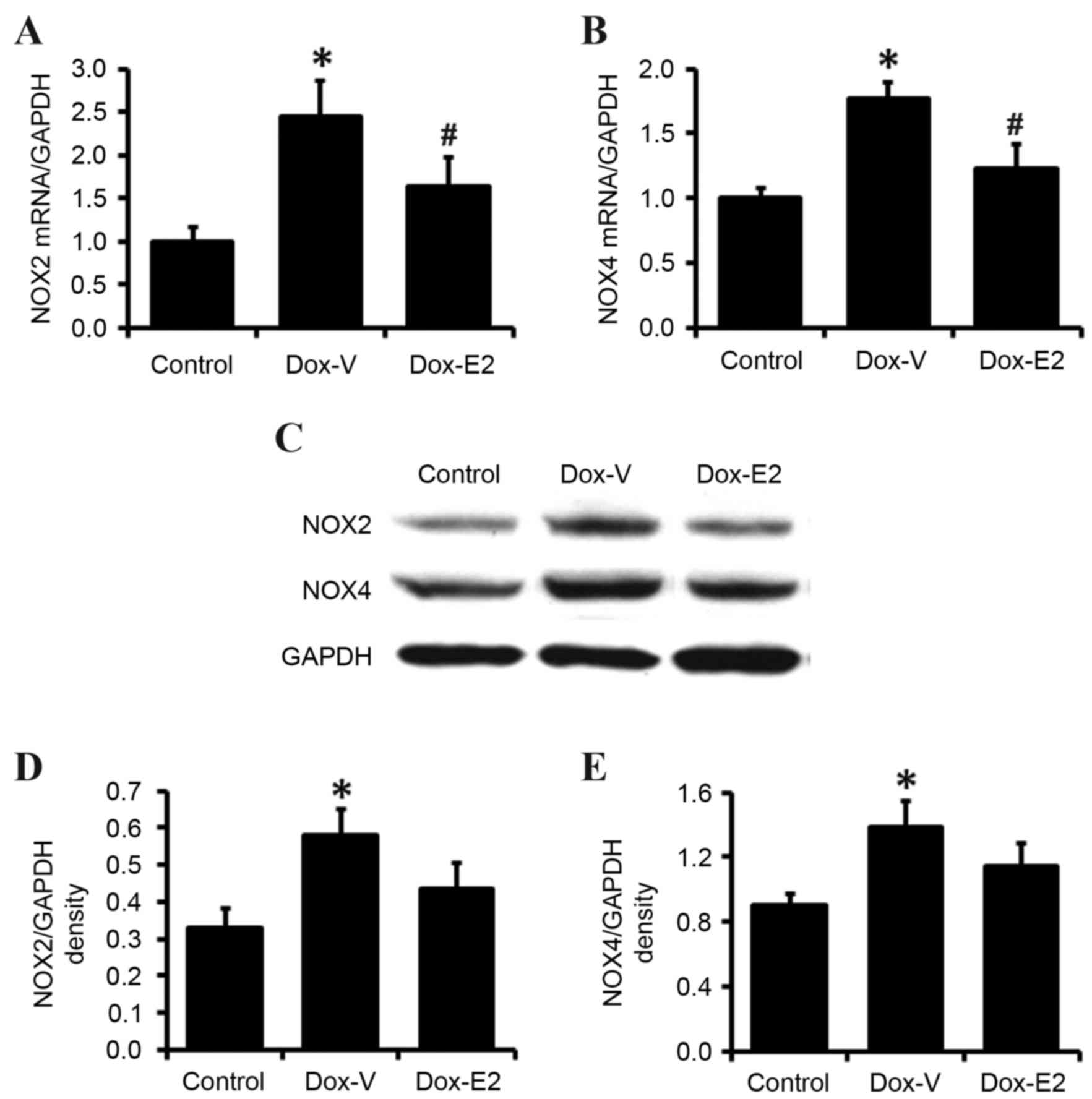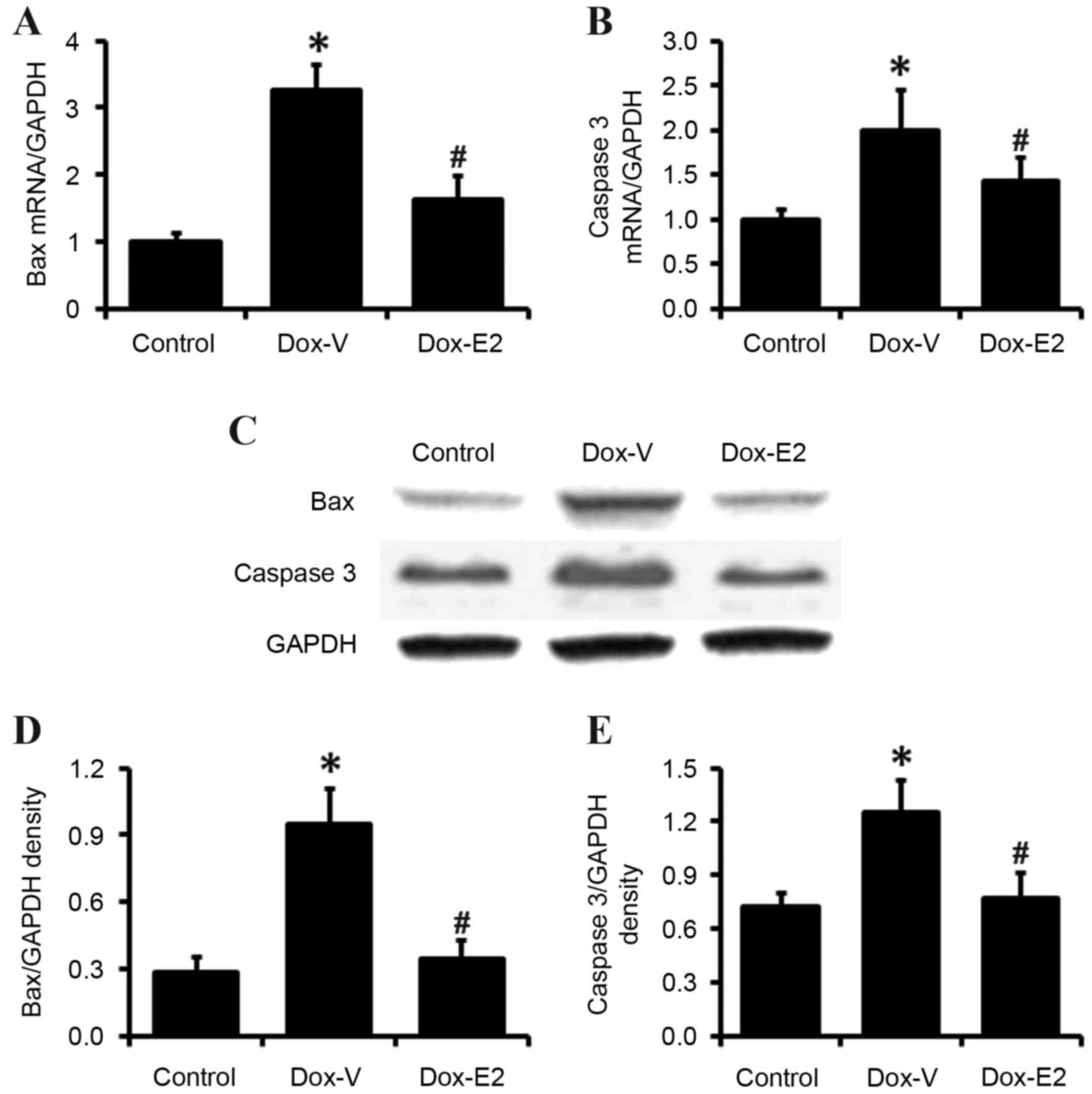|
1
|
Batty N, Hagemeister FB, Feng L, Romaguera
JE, Rodriguez MA, McLaughlin P, Samaniego F, Copeland A, Dabaja BS
and Younes A: Doxorubicin, bleomycin, vinblastine and dacarbazine
chemotherapy with interferon for advanced stage classic Hodgkin
lymphoma: A 10-year follow-up study. Leuk Lymphoma. 53:801–806.
2012. View Article : Google Scholar : PubMed/NCBI
|
|
2
|
Ogilvie CM, Crawford EA, Slotcavage RL,
King JJ, Lackman RD, Hartner L and Staddon AP: Treatment of adult
rhabdomyosarcoma. Am J Clin Oncol. 33:128–131. 2010.PubMed/NCBI
|
|
3
|
Carvalho FS, Burgeiro A, Garcia R, Moreno
AJ, Carvalho RA and Oliveira PJ: Doxorubicin-induced
cardiotoxicity: From bioenergetic failure and cell death to
cardiomyopathy. Med Res Rev. 34:106–135. 2014. View Article : Google Scholar : PubMed/NCBI
|
|
4
|
Shi Y, Moon M, Dawood S, McManus B and Liu
PP: Mechanisms and management of doxorubicin cardiotoxicity. Herz.
36:296–305. 2011. View Article : Google Scholar : PubMed/NCBI
|
|
5
|
Langer SW: Dexrazoxane for the treatment
of chemotherapy-related side effects. Cancer Manag Res. 6:357–363.
2014. View Article : Google Scholar : PubMed/NCBI
|
|
6
|
Molix L: Sex differences in cardiovascular
health: Does sexism influence women's health? Am J Med Sci.
348:153–155. 2014. View Article : Google Scholar : PubMed/NCBI
|
|
7
|
Brower GL, Gardner JD and Janicki JS:
Gender mediated cardiac protection from adverse ventricular
remodeling is abolished by ovariectomy. Mol Cell Biochem.
251:89–95. 2003. View Article : Google Scholar : PubMed/NCBI
|
|
8
|
Xu Y, Arenas IA, Armstrong SJ and Davidge
ST: Estrogen modulation of left ventricular remodeling in the aged
heart. Cardiovasc Res. 57:388–394. 2003. View Article : Google Scholar : PubMed/NCBI
|
|
9
|
Van Eickels M, Grohé C, Cleutjens JP,
Janssen BJ, Wellens HJ and Doevendans PA: 17beta-estradiol
attenuates the development of pressure-overload hypertrophy.
Circulation. 104:1419–1423. 2001. View Article : Google Scholar : PubMed/NCBI
|
|
10
|
Nelson LR and Bulun SE: Estrogen
production and action. J Am Acad Dermatol. 45:(3 Suppl). S116–S124.
2001. View Article : Google Scholar : PubMed/NCBI
|
|
11
|
Ropero AB, Eghbali M, Minosyan TY, Tang G,
Toro L and Stefani E: Heart estrogen receptor alpha: Distinct
membrane and nuclear distribution patterns and regulation by
estrogen. J Mol Cell Cardiol. 41:496–510. 2006. View Article : Google Scholar : PubMed/NCBI
|
|
12
|
Murphy E: Estrogen signaling and
cardiovascular disease. Circ Res. 109:687–696. 2011. View Article : Google Scholar : PubMed/NCBI
|
|
13
|
Kunnas TA, Laippala P, Penttilä A,
Lehtimäki T and Karhunen PJ: Association of polymorphism of human
alpha oestrogen receptor gene with coronary artery disease in men:
A necropsy study. BMJ. 321:273–274. 2000. View Article : Google Scholar : PubMed/NCBI
|
|
14
|
Jankowska EA, Rozentryt P, Ponikowska B,
Hartmann O, Kustrzycka-Kratochwil D, Reczuch K, Nowak J,
Borodulin-Nadzieja L, Polonski L, Banasiak W, et al: Circulating
estradiol and mortality in men with systolic chronic heart failure.
JAMA. 301:1892–1901. 2009. View Article : Google Scholar : PubMed/NCBI
|
|
15
|
Kadokami T, McTiernan CF, Higuichi Y, Frye
CS, Kubota T and Feldman AM: 17 Beta-estradiol improves survival in
male mice with cardiomyopathy induced by cardiac-specific tumor
necrosis factor-alpha overexpression. J Interferon Cytokine Res.
25:254–260. 2005. View Article : Google Scholar : PubMed/NCBI
|
|
16
|
Cook MB, McGlynn KA, Devesa SS, Freedman
ND and Anderson WF: Sex disparities in cancer mortality and
survival. Cancer Epidemiol Biomarkers Prev. 20:1629–1637. 2011.
View Article : Google Scholar : PubMed/NCBI
|
|
17
|
Wang H, Da Silva J, Alencar A, Zapata-Sudo
G, Lin MR, Sun X, Ahmad S, Ferrario CM and Groban L: Mast cell
inhibition attenuates cardiac remodeling and diastolic dysfunction
in middle-aged, ovariectomized Fischer344 × Brown Norway rats. J
Cardiovasc Pharmacol. 68:49–57. 2016. View Article : Google Scholar : PubMed/NCBI
|
|
18
|
Livak KJ and Schmittgen TD: Analysis of
relative gene expression data using real-time quantitative PCR and
the 2(−Delta Delta C(T)) method. Methods. 25:402–408. 2001.
View Article : Google Scholar : PubMed/NCBI
|
|
19
|
Blenck CL, Harvey PA, Reckelhoff JF and
Leinwand LA: The importance of biological sex and estrogen in
rodent models of cardiovascular health and disease. Circ Res.
118:1294–1312. 2016. View Article : Google Scholar : PubMed/NCBI
|
|
20
|
Knowlton AA and Korzick DH: Estrogen and
the female heart. Mol Cell Endocrinol. 389:31–39. 2014. View Article : Google Scholar : PubMed/NCBI
|
|
21
|
Tivesten A, Vandenput L, Labrie F,
Karlsson MK, Ljunggren O, Mellström D and Ohlsson C: Low serum
testosterone and estradiol predict mortality in elderly men. J Clin
Endocrinol Metab. 94:2482–2488. 2009. View Article : Google Scholar : PubMed/NCBI
|
|
22
|
Balakrishnan B, Chiplunkar SV and Indap
MM: Methanol extract of euchelus asper prevents bone resorption in
ovariectomised mice model. J Osteoporos. 2014:3481892014.
View Article : Google Scholar : PubMed/NCBI
|
|
23
|
Shi M, Ma L, Zhou L and Fu P: Renal
protective effects of 17β-estradiol on mice with acute aristolochic
acid nephropathy. Molecules. 21:pii: E1391. 2016. View Article : Google Scholar
|
|
24
|
Ghosh J, Das J, Manna P and Sil PC: The
protective role of arjunolic acid against doxorubicin induced
intracellular ROS dependent JNK-p38 and p53-mediated cardiac
apoptosis. Biomaterials. 32:4857–4866. 2011. View Article : Google Scholar : PubMed/NCBI
|
|
25
|
Han XZ, Gao S, Cheng YN, Sun YZ, Liu W,
Tang LL and Ren DM: Protective effect of naringenin-7-O-glucoside
against oxidative stress induced by doxorubicin in H9c2
cardiomyocytes. Biosci Trends. 6:19–25. 2012.PubMed/NCBI
|
|
26
|
Ichihara S, Yamada Y, Kawai Y, Osawa T,
Furuhashi K, Duan Z and Ichihara G: Roles of oxidative stress and
Akt signaling in doxorubicin cardiotoxicity. Biochem Biophys Res
Commun. 359:27–33. 2007. View Article : Google Scholar : PubMed/NCBI
|
|
27
|
Mut-Salud N, Álvarez PJ, Garrido JM,
Carrasco E, Aránega A and Rodríguez-Serrano F: Antioxidant intake
and antitumor therapy: Toward nutritional recommendations for
optimal results. Oxid Med Cell Longev. 2016:67195342016. View Article : Google Scholar : PubMed/NCBI
|
|
28
|
Bao MH, Dai W, Li YJ and Hu CP:
Rutaecarpine prevents hypoxia-reoxygenation-induced myocardial cell
apoptosis via inhibition of NADPH oxidases. Can J Physiol
Pharmacol. 89:177–186. 2011. View
Article : Google Scholar : PubMed/NCBI
|
|
29
|
Zhang YS, He L, Liu B, Li NS, Luo XJ, Hu
CP, Ma QL, Zhang GG, Li YJ and Peng J: A novel pathway of NADPH
oxidase/vascular peroxidase 1 in mediating oxidative injury
following ischemia-reperfusion. Basic Res Cardiol. 107:2662012.
View Article : Google Scholar : PubMed/NCBI
|
|
30
|
Nabeebaccus A, Zhang M and Shah AM: NADPH
oxidases and cardiac remodelling. Heart Fail Rev. 16:5–12. 2011.
View Article : Google Scholar : PubMed/NCBI
|
|
31
|
Gilleron M, Marechal X, Montaigne D,
Franczak J, Neviere R and Lancel S: NADPH oxidases participate to
doxorubicin-induced cardiac myocyte apoptosis. Biochem Biophys Res
Commun. 388:727–731. 2009. View Article : Google Scholar : PubMed/NCBI
|
|
32
|
Zhao Y, McLaughlin D, Robinson E, Harvey
AP, Hookham MB, Shah AM, McDermott BJ and Grieve DJ: Nox2 NADPH
oxidase promotes pathologic cardiac remodeling associated with
Doxorubicin chemotherapy. Cancer Res. 70:9287–9297. 2010.
View Article : Google Scholar : PubMed/NCBI
|
|
33
|
Spallarossa P, Altieri P, Garibaldi S,
Ghigliotti G, Barisione C, Manca V, Fabbi P, Ballestrero A,
Brunelli C and Barsotti A: Matrix metalloproteinase-2 and −9 are
induced differently by doxorubicin in H9c2 cells: The role of MAP
kinases and NAD(P)H oxidase. Cardiovasc Res. 69:736–745. 2006.
View Article : Google Scholar : PubMed/NCBI
|
|
34
|
Siwik DA, Pagano PJ and Colucci WS:
Oxidative stress regulates collagen synthesis and matrix
metalloproteinase activity in cardiac fibroblasts. Am J Physiol
Cell Physiol. 280:C53–C60. 2001.PubMed/NCBI
|
|
35
|
Grieve DJ, Byrne JA, Siva A, Layland J,
Johar S, Cave AC and Shah AM: Involvement of the nicotinamide
adenosine dinucleotide phosphate oxidase isoform Nox2 in cardiac
contractile dysfunction occurring in response to pressure overload.
J Am Coll Cardiol. 47:817–826. 2006. View Article : Google Scholar : PubMed/NCBI
|
|
36
|
Sumi D, Hayashi T, Matsui-Hirai H, Jacobs
AT, Ignarro LJ and Iguchi A: 17beta-estradiol inhibits NADPH
oxidase activity through the regulation of p47phox mRNA and protein
expression in THP-1 cells. Biochim Biophys Acta. 1640:113–118.
2003. View Article : Google Scholar : PubMed/NCBI
|
|
37
|
Miller AA, Drummond GR, Mast AE, Schmidt
HH and Sobey CG: Effect of gender on NADPH-oxidase activity,
expression, and function in the cerebral circulation: Role of
estrogen. Stroke. 38:2142–2149. 2007. View Article : Google Scholar : PubMed/NCBI
|
|
38
|
Zhang QG, Raz L, Wang R, Han D, De Sevilla
L, Yang F, Vadlamudi RK and Brann DW: Estrogen attenuates ischemic
oxidative damage via an estrogen receptor alpha-mediated inhibition
of NADPH oxidase activation. J Neurosci. 29:13823–13836. 2009.
View Article : Google Scholar : PubMed/NCBI
|
|
39
|
Hosseinzadeh L, Behravan J, Mosaffa F,
Bahrami G, Bahrami A and Karimi G: Curcumin potentiates
doxorubicin-induced apoptosis in H9c2 cardiac muscle cells through
generation of reactive oxygen species. Food Chem Toxicol.
49:1102–1109. 2011. View Article : Google Scholar : PubMed/NCBI
|
|
40
|
Kazama K, Okada M and Yamawaki H:
Adipocytokine, omentin inhibits doxorubicin-induced H9c2
cardiomyoblasts apoptosis through the inhibition of mitochondrial
reactive oxygen species. Biochem Biophys Res Commun. 457:602–607.
2015. View Article : Google Scholar : PubMed/NCBI
|
|
41
|
Claycomb WC and Palazzo MC: Culture of the
terminally differentiated adult cardiac muscle cell: A light and
scanning electron microscope study. Dev Biol. 80:466–482. 1980.
View Article : Google Scholar : PubMed/NCBI
|



















